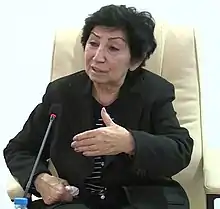Farida Mammadova
Farida Jafar gizi Mammadova (Azerbaijani: Fəridə Cəfər qızı Məmmədova) (born 8 August 1936, Shirvan) is an Azerbaijani historian who specialises in the history of ancient Caucasian Albania.
Farida Mammadova | |
|---|---|
 | |
| Born | August 8, 1936 |
She is the author of numerous research papers, articles and books on Azerbaijani ancient and medieval history. She lectures at the Baku State University, Azerbaijan Pedagogical University, and is the head of the Department of Humanities in the Western University in Baku. Farida Mammadova works at the Institute of History of the National Academy of Sciences of Azerbaijan. In her research, she is known to be a disciple of the late Azerbaijani historian and the former vice-president of the Azerbaijan National Academy of Sciences Ziya Bunyadov.
Mammadova's area of focus has been the study of the development of Caucasian Albania, its ethnic composition, political and social life, the development of Christianity in Caucasian Albania, Church of Caucasian Albania, arts and literature.[1]
Critics
Mammadova's theories have been criticized by foreign authors for the misinterpretation of historical sources and revisionism.[2][3] Among the critics of Mammadova's works is Russian historian V.A. Shnirelman, who dedicated a whole chapter in his book Wars of Memory to Mammadova's mistakes, misinterpretations and traced the influence of the anti-Armenian authors V.L. Velichko and Ziya Bunyadov to her theories.[4]
According to Thomas de Waal, Mammadova's theories on the Albanians were formulated in such a way as "to separate the Armenians completely from the Caucasus." "She has placed Caucasian Albania on the territory of modern Armenia: all the territories, churches and monasteries in Armenia have been designated as Albanian." He describes Mammadova's theories as "an improved version of what became a very rough tool in Azerbaijan".[5]
During her interviews Mammadova has made anti-Armenian statements, including:
And it is known that on whole planet exactly the Armenian people are distinguished by their absence of spiritual and other human values.[6]
And further:
There are only two nations with an identity but no state....The Jews and the Armenians. The difference is that the Jews created a state in their historical homeland; the Armenians created one not in their historical homeland.[7]
Selected publications
- The History of Albanians by Moses Kalankaytuk as a Source on the Social Organization of Caucasian Albania, Baku,1977.
- Political History and Historical Geography of Caucasian Albania, Baku, 1986
- Le problem de l'ethnos alban-caucasien, "L'antropoloqie sovietique", Paris, 1990
- Christianity in Caucasian Albania
- Caucasian Albania and the History of Albanians, Baku (in Russian), 2005
External links
References
- Farida Mammadova Archived 2012-04-02 at the Wayback Machine. Azerbaijan National Academy of Sciences.
- "Albanian Myth" (in Russian) / V.A. Shnirelman, "Voyni pamyati. Mifi, identichnost i politika v Zakavkazye", Moscow, Academkniga, 2003
- Thomas de Waal, Black Garden, chapter "Urekavank", in Russian, 2005
- "Albanian Myth" (in Russian) / V.A. Shnirelman, "Voyni pamyati. Mifi, identichnost i politika v Zakavkazye", Moscow, Academkniga, 2003
- Thomas de Waal, Black Garden, chapter "Urekavank", in Russian, 2005
- Фарида Мамедова: «Разрушив захоронение «Агадеде», армяне в очередной раз пытаются посягнуть на историю Азербайджана», Day.Az daily, January 06, 2006 (in Russian) Archived November 17, 2009, at the Wayback Machine
- De Waal, Thomas. Black Garden: Armenia and Azerbaijan through War and Peace. New York: New York University Press, 2003, p. 154.